Portrait of Libyan Businessman: The Interview with Mohamed Raied
Mohamed Raied, Chairman of Al-Naseem Food Industries
“Everyone knows it was difficult for 40 years, especially difficult for the private sector in Libya. I had started with a food stuff trade in 1989 on a small scale with one shop in Misrata, then had an ice cream factory in 1993 and first I had only a basic ice cream machine that would produce 2,000 pieces/cups,” recalls Mohamed Raied. Today, Al Naseem is trying to be number one in Libya in producing dairy products.
Interview with Mohamed Raied, Chairman of Al-Naseem Food Industries
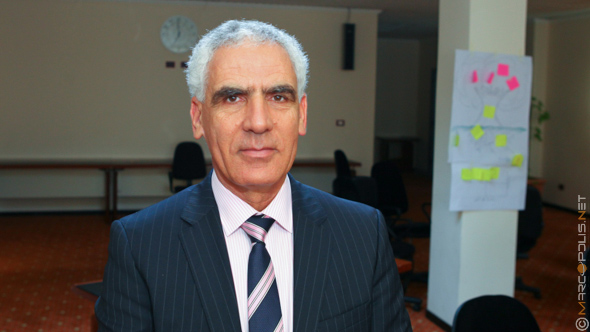
Al-Naseem Food Industries is a private sector company. You come from a humble environment yet you were still able to build one of the most successful private companies in Libya. We would like to hear about your risk-taking experience in Libya. Could you describe how you became a businessman?
Everyone knows it was difficult for 40 years, especially difficult for the private sector in Libya. I had started with a food stuff trade in 1989 on a small scale with one shop in Misrata, then had an ice cream factory in 1993 and first I had only a basic ice cream machine that would produce 2,000 pieces/cups. From that year on, I tried to work in industry and trade and grow my business as the years passed on. In 2000 I started a small factory for yogurt and butter milk. In 2005 I relocated the businesses into a larger industrial area where I built a new factory that complied with international standards. In 2006 I acquired three thermo machines; one for ice cream, one for yogurt – the latter would produce 15,000 pieces per hour and another for butter milk which would yield 10,000 liters per hour. Since then we have been acquiring one new machine on a yearly basis.
Today we are trying to be number one in Libya in producing dairy products. We have huge production capacities which enable us to distribute our produce all over Libya while keeping the prices at the same level. At the same time, we are trying hard to give work opportunities to Libyan people, we currently have almost 1,000 employees. Our factory covers an area of 7 hectares (70,000 m2). 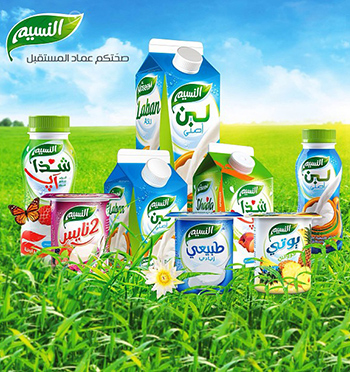
In 2008 we have started exporting ice cream to Tunisia and we also opened a factory over there. We bought Nestle (ice cream) and we now cater for about 25% of Tunisian ice cream market. We are also trying to export ice cream to another countries such as Morocco and states in the Gulf.
All these years we have been aiming to comply with international standards and requirements, we have so far obtained ISO 22000 (food safety) and ISO 9001 (administration). We also acquired the star quality for leadership award from a company in New York in 2010.
After the 2011 revolution we doubled our capacity and we are trying as much as we can to cover the local market. Dairy products, because of their specific characteristics (e.g. shelf life of less than one month), should be produced locally in Libya and distributed as fresh products.
Libya is a big country, however we succeeded to distribute our high quality products all over Libya while keeping the same price everywhere.
What are your life beliefs? What kept you going in life?
I come from a city called Misrata. I graduated as a Material Science engineer from Tripoli university in 1983. Then I managed not to be recruited into the compulsory army service, so I stayed one year without work. I began to work on a farm and then in the construction sector as a builder. Then I worked in an iron and steel complex (LISCO) for 5 years and I gained some experience. I have always liked to trade but the doors in Libya were closed at that time, there used to be no private sector. However it changed in 1987 when they allowed trade and I became a small distributor for food stuff. As I noted before, my small shop was located in Misrata, on the road near the iron and steel complex. My small shop has grown and transformed itself into the largest private company in Libya, which supplies the local market with high quality products while offering almost 1,000 work opportunities for Libyans.
I studied English at school but I have never left Libya to practice my English abroad. I have always been the head of the board of my factory and that has always kept me busy.
How did you take this risk of having a business? What makes you different from other people – entrepreneurs in Libya?
After the 2011 revolution we doubled our capacity and we are trying as much as we can to cover the local market. Dairy products, because of their specific characteristics (e.g. shelf life of less than one month), should be produced locally in Libya and distributed as fresh products.
First of all, we are a family business, we are five brothers. I did not like to work for the government or LISCO as other people; I liked trade and that is how it all started. In between 1989 and 1993 I was importing ice cream from Tunisia in a lorry together with my brother. I had an idea about how to distribute ice cream here in Libya and so I followed it.
We succeeded because we are a family, we have been working together since the very beginning and there used to be no such goods in Libya in 1980’s, so we were able to sell all our products easily. We have always been following the international standards and requirements, we have been visiting most of the fairs in Europe and companies that manufacture dairy products machines.
When I go back in time now, I think we have chosen to follow a very difficult path. During Gaddafi times, most of people preferred to work in construction companies; it was much easier as they were getting commissions and didn’t work at all.
Today Libyans recognize us as a successful company; they have always liked our products.
How was the business under Gaddafi? Is the situation better now in the post-Gaddafi Libya?
The situation is much better because we feel we are free. We used to work in the shadow; Gaddafi, his sons and other relatives didn’t like any one to become famous, so I had to hide everything concerning our business. If anyone asked me how much labor I had, I would say 100 even though the reality was more than 600. If they asked about my capital, I would tell them a quarter or less. I could not tell them the truth.
 However now, after the revolution, we are happy and we publicly state we are businessmen, we have good facilities and capital. Unfortunately, the government in Libya is still not encouraging or helping the private sector. It seems like the mentality hasn’t changed yet. Until now there has not been made any decision that would help the private sector in Libya. Whenever I visit a minister – or even the prime minister – they say they will encourage the private sector or that they are with the private sector but the reality is very different; the government allocates the money to jobless people and this is affecting us, we face a lot of difficulties because the government’s policy is completely wrong.
However now, after the revolution, we are happy and we publicly state we are businessmen, we have good facilities and capital. Unfortunately, the government in Libya is still not encouraging or helping the private sector. It seems like the mentality hasn’t changed yet. Until now there has not been made any decision that would help the private sector in Libya. Whenever I visit a minister – or even the prime minister – they say they will encourage the private sector or that they are with the private sector but the reality is very different; the government allocates the money to jobless people and this is affecting us, we face a lot of difficulties because the government’s policy is completely wrong.
The government may be in a difficult situation, because if they don’t pay the wages to the people, they will happen to be in the streets, disappointed with democracy and a similar dictator can come to rule again.
The government thinks they will be better off when they give money to the jobless but in reality it works against them. Jobless people receive money but since they don’t work, they have time to look for the problems. If they were pushed to work and earn their money, it would be different. I think people should not be getting money without work. All publicly-owned factories, where employees refuse to work but still get their salaries, should be handed over to the private hands and this move would solve many problems.
Today, if I employ a jobless person and give him or her 1,000 Libyan dinars, the government will take 20% of the salary for taxes and social insurance. I view this as a very serious problem; the government should help us to pay these salaries and not deduct 20% of the private sector employees.
What should be the strategy of the government? What advice would you give to Libyan government?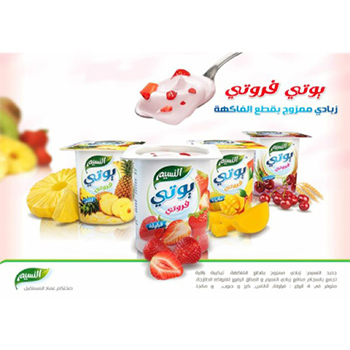
I would advise them to make good decisions, to really help people who work in the private sector and give them opportunities. They could pay the social insurance instead of the private sector workers. There should be no custom or VAT taken from the salary. The government should provide the private sector employees with opportunities for training and/or obtaining their university degree abroad. They should offer them opportunities for growth and progress – to have the same opportunities like the workers employed by the public sector in Libya.
The reality is unfortunately a total opposite to what I just mentioned. The government pays people who go to work once a week or less than that. And I can give those people good salaries – 5,000-8,000 Libyan dinars, however the 20% (sometimes 25%) deduction is quite damaging; the workers should get it, it’s theirs.
The conditions within private sector are better in Tunisia. It is easy to set up a company over there and if I need workers, I can take two or three from Tunisian Ministry of Labor. Tunisian government pays them a yearly salary as training.
The current scheme in Libya discourages workers to seek their employment in the private sector. The mentality of most of our officials (or workers at ministries) is that the private sector owners and businessmen are not good; they are thieves, insignificant and small. This mentality has been present since the Gaddafi era. It is difficult to deal with the politicians in the government. They think we are only small businesses; we have to persuade them we are big and explain them that 90% of our employees are Libyans. We have the best machines and technology in the world. Our employees continued to work even at the time of the revolution in 2011, unlike workers in other factories who left in the first week of the revolt.
Prior to the revolution, I used to pay 300 Libyan dinars per month on average to our employees and now I pay them 1,000 Libyan dinars but they still don’t like it because the government pays such amount only for little work or sometimes no work at all.
The government already tried to encourage the private sector, for example at the port where they hired a private sector company to work on the shipment and run it. Yet people went on strike…
No, it should not be done in this way. The government has to encourage people to work in the first place, not just bring one businessman and ask him to do the job. The port needs an investment of maybe 1 billion Libyan dinars and is now run by a good company; the authority of Libyan ports is a suitable company for this role.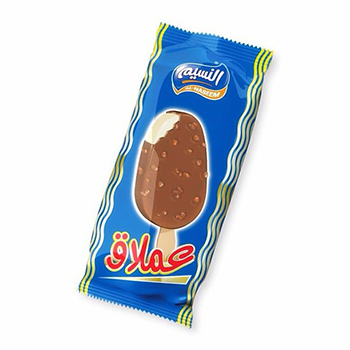
Everybody should be helped to work, including the small and medium-size enterprises. The Central bank of Libya has a wrong policy of asking businesses to open a letter of credit which requires getting goods from only certain companies. They don’t allow transferring funds. Libya imports about 90% of what is needed. However, in my opinion, people should have the opportunity to transfer money through banks not through the black market. The currency is suffering as there is a 10% difference between the black market and the currency exchange rates in banks. As a result, the Central bank has already lost a lot of money.
Does that mean that if you hold Euros you should go to the Central bank to exchange the money and then transfer it?
All people who have a license dealing with goods have to go to the bank and fill out a form to transfer their money (e.g. 20,000 or 30,000 Libyan dinars) so that they will be able to import goods from Turkey and Dubai. My company can open a LC, there is no problem because we are known and big, but small and medium-size companies cannot do that. I used to import goods such as almonds or pistachio from Dubai by transfer or cash, it was easy for us.
Can you tell us more about Misrata?
Misrata is the third largest city in Libya, it is an active industrial and commercial city. Many people in Misrata work in the private sector. Prior to 1979, most of the trade in Libya was in the hands of the people of Misrata. This explains why Qaddafi did not like us and hit Misrata. He punished us by closing all trade in Libya so that Misrata people were forced to look for other jobs, like in agriculture, construction or transportation. There is no one without work in this city; it is safe and doing better than other parts of Libya. People of Misrata are independent and hard-working, and that has helped them to become successful.
Can you give us some statistics about your growth, by how much are you growing each year as a group?
We have started producing in 1993. Our daily production of ice cream used to be 2,000 pieces of ice cream per hour. Of course, our current production is significantly higher. We currently produce nearly 100,000 pieces of yogurt per hour and, in the season, 100,000 pieces of ice cream per hour. So we produce nearly 2 million pieces of yogurt per day.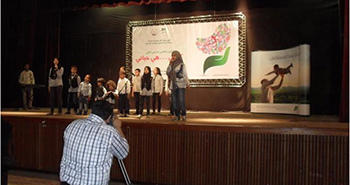
Our turnover for 2013 should equal to almost 200 million Libyan dinars. We have 5 sister companies; a company for producing edible oil (corn oil, maize), which produces 200 tons of oil per day. We have a company for importing industrial equipment and spare parts. We also run a logistics company, we are the agent of TNT. We have a company for construction which builds our factories. There is another company which imports medical equipment. Lastly, there is a company for food trading, which serves an agent for Happy Cow Cheese and a margarine from Tunisia. We currently hold 80% share in the margarine market in Libya.
What was your growth increase between 2012 and 2013?
Our production nearly doubled in the recent year, so it increased by almost 100%. We also doubled our turnover. We used to produce 300 tons, now we produce almost 600 tons.
What is your vision for Al-Naseem?
We are trying to improve our products ever day and we are discussing three or four investment projects at the moment while some of them are already under construction. We would like to start producing cardboard (carton), bottles and cups. We have completed a study for a cheese factory. We would like to expand as much as we can.
What do you believe in when it comes to Libya and its future?
We completely believe in Libya. We do not think of leaving the country. We have everything on earth in Libya. Even at the time of the revolution my three sons came back and lived in Libya. I do not even like to travel; I go for business trips for a few days but then I always like to come back. We have to stay here and improve the economy.
You cannot build these projects by yourself, you need an international expertise for that. Do you have difficulties when persuading others to come to Libya?
We were ready to produce in 2012. Because of the situation in Libya, most of the companies didn’t want to come to the country and that delayed us by a year. Today we receive foreign visitors on a weekly basis. They have never encountered any problem. Now it is better and safer, especially in Misrata. Misrata has daily flights to Istanbul, Amman, Cairo and Tunisia.
We are focusing on work and high quality, we employ more than 150 experienced Libyan engineers who are happy to work with us and develop the company.
By the end of this year we are hoping to open a milk farm with 300 of cattle. We now depend on importing powder milk from abroad. So we have contracted a Danish company for this small farm project.